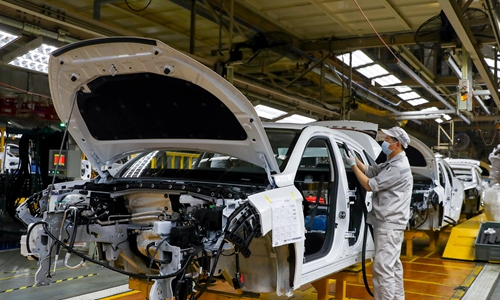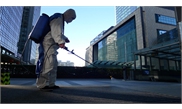SOURCE / INDUSTRIES
Wuhan's Silicon Valley on path of resumption

A worker is on the assembly line of Dongfeng passenger vehicle on Monday in Wuhan, capital of Central China's Hubei Province. Photo: cnsphotos
Enterprises in the high-tech zone of Wuhan, capital of Central China's Hubei Province, where the coronavirus outbreak first occurred in the country, are racing to apply for the approval of business resumption after two months' lockdown, although lack of labor still weighs on the recovery.
Wuhan, the hardest hit city by the coronavirus, has started to loosen restrictions and gradually resume work. The city and wider Hubei Province have seen zero new confirmed cases and suspected cases of the coronavirus for five consecutive days, a spokesperson for the National Health Commission said on Monday.
With the epidemic situation improving, enterprises in the East Lake High-Tech Development Zone, also known as Optics Valley, which is dubbed the city's Silicon Valley, have been revving up their application for production resumption.
Li Chuan, a manager at Wuhan Land Electronic Co, a high-tech enterprise specializing in the development and production of battery test equipment based in Optics Valley, said the firm obtained approval from the zone's epidemic prevention and control unit over the weekend.
"We are busy doing the disinfection work before our on-site workers can return to their posts starting from tomorrow," Li told the Global Times on Monday, adding the company's administrative employees have been working at home since February 1.
The notice of approval paper that Li obtained shows there are 109 industrial enterprises in Optics Valley that have been approved for resumption. They range from such sectors as optoelectronics and high-end equipment manufacturing to environmental protection.
However, some high-tech firms are still waiting anxiously for the approval. Wuhan Osun Photoelectric Technology Co, also an Optics Valley-based firm engaged in researching and manufacturing optical, mechanical and electronic integration, said Monday that it has not resumed work and is waiting for further notice, with all of its employees staying at home. The firm has so far paid its staff normal salaries.
Boasting more than 90,000 firms, Optics Valley had the highest output of Wuhan's high-tech industries at over 1 trillion yuan ($143 billion) in 2018, according to the Xinhua News Agency. The high-tech zone, which is the base of China's optoelectronic industry, has a 25 percent share of the world market and over 60 percent in China in terms of optical fiber.
Major Chinese tech firms including Lenovo, the world's largest personal computer supplier, and Xiaomi, the smartphone giant all have their facilities in Optics Valley.
Lenovo told the Global Times on Monday that its manufacturing complex in Wuhan recently become operational again on a limited basis in line with government guidelines and regulations for the wider Hubei area.
It is expected all of its facilities in China will recover full capacity by the end of this month.
Xiaomi said that an 80 percent work resumption rate had been achieved as of Thursday in its Wuhan facility, ensuring the launch of the Redmi K30 Pro will go ahead on Tuesday as scheduled.
Besides, there are zero infections among its 2,000 employees in Wuhan, according to Wang Xiang, president of Xiaomi.
"We believe the halt in production has affected results in the first quarter, but as smartphones are essential devices, the trend of a phone switch brought by 5G development is unstoppable. We have not changed our 5G product launch strategy, and we expect at least 10 new 5G smartphone models to hit the market this year," Wang said.
Apart from those pillar industries, Optics Valley is greenlighting internet firms by simplifying their application procedures and accelerating the approval speed. The management committee of Optics Valley has so far approved a total of 1,200 internet firms to resume work, according to domestic news site tech.qq.com.
The management committee did not respond to Global Times enquiries as of press time.
Wuhan-based enterprises that are important to the national and global industry chains and those closely related to people's lives are allowed to continue operation or resume work, said Cao Guangjing, deputy governor of Hubei, at a press conference last week.
Companies in the auto sector and phosphate fertilizer are of considerable significance to the industrial chains in the country, Cao said, adding that further delays for them in work resumption could cause a major impact.
Ye Qing, a deputy director of the statistics bureau of Hubei, told the Global Times on Monday that there are several firms in Optics Valley that did not halt operation during the epidemic outbreak in the city as their products are highly related to the fight against the coronavirus.
"It is expected that Wuhan's GDP will get back on track in the second quarter although the beginning of April will still see some businesses suffering an impact," said Ye.
Ye forecast that more firms would be approved for full resumption in the upcoming week and the city's capacity will recover to more than 50 percent by early April.
Despite the greenlight to resume business, many firms in Optics Valley are grappling with the worker shortage issue, said Wang Yanhui, head of the Shanghai-based Mobile China Alliance.
Residents living in and outside Wuhan will be allowed to travel into the city to resume work if they have a green health code issued by the government and normal body temperature.
"As Wuhan's public transport is soon to reopen, more people will flow back to the city and resolve the labor shortage," said Ye.
Wuhan is disinfecting its subway system on Monday, according to city officials. And its train station was also disinfected on Friday, after being shut down 58 days ago when the local government adopted drastic measures to contain the virus spread.
It is expected that the train station will resume services by the end of March, according to Ye.



